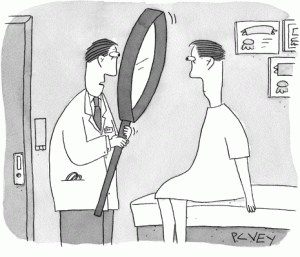What’s more important: Your assessment or you intervention? Seems like a pretty simple question. And I would not be surprised if many of you are immediately thinking of one the standard responses-responses that I preach myself.
1. If you’re not assessing, you’re guessing
2. Your intervention is only as good as your assessment.
It is response #2 that has gotten me thinking of late. Through my years of learning, I have observed some amazing therapists, orthopedist, medical doctors, chiropractors, Ph.D.’s soft tissue specialists and fitness professionals perform some of the most extensive, problem- solving neuromusculoskeletal assessments you could imagine. I’ve watch them spend from an hour to several hours seeking out hidden clues, uncovering critical information and sleuthing way beyond the standard protocols.
In statement #2, if your intervention is only as good as your assessment you would think it stands to reason that if your assessment is incredibly thorough and accurate, then so should your intervention? In my observations, that this is not always the case.

In my humble opinion, if the identifying of critical “big rocks” is so challenging I find it hard to believe that generic protocols for that region of the body would suffice as an intervention. It would stand to reason, the more challenging the big rock is to find, the more complicated the surrounding compensation patterns will be. In the way the training the core has been the panacea for everything from low back pain to giving sight to the blind, I have to scratch my head at the absence of specificity in program design to match that of the assessment.
To me, specificity does not mean working with a body part or structure in isolation. It means organizing building blocks that guide the body down a path of successful motion through novel movements that fly below their existing thresholds.
Forgive this next statement as it is blatant self-promotion: I believe that I am awesome at asking great questions. Getting the right answers not always so easy…..
By asking better questions we broaden our perspective and therefore the possibilities of the underlying problems. By doing so we are able to frame a better strategy for our problem solving.
If you think about it, this applies to all of us regardless of what our level of experience or what we are trying to sleuth about our client or patient. For me, it is movement related issues. For you, it might be why they can’t lose those last 5 lbs. or why they can’t stay consistent with their sessions.
At Function First we have always prided ourselves on the unique and strategic corrective exercise programs our clients are given. No two programs are ever exactly the same because no two clients are exactly the same.
Therefore, I would suggest that if you are going to assess with the precision of a diamond cutter, don’t design your intervention around a jackhammer.
What do you think?
Committed to Raising the Bar,
Anthony Carey M.A., CSCS, AHFS